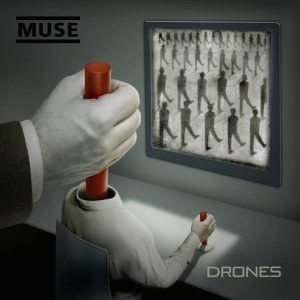Album Review: Muse – Drones
 It was only a matter of time before the Devon stadium-rock trio released a concept album. Inspired by the rise of military technology and ‘remote killings’: Drones bolsters Muse, proudly, into more contentious territory.
It was only a matter of time before the Devon stadium-rock trio released a concept album. Inspired by the rise of military technology and ‘remote killings’: Drones bolsters Muse, proudly, into more contentious territory.
Preluded by a handful of singles (‘Psycho’, ‘Dead Inside’, ‘Mercy’) and a number of festival appearances, it’s safe to say Muse are confident about their latest offering. So much so that frontman Matt Bellamy proclaims it to be their greatest album yet. But Drones is a strangely problematic record. Sonically, it is exciting. It sees a return to the heavy guitar prowess that feels long overdue from the band. Yet it also lacks direction. It follows the unfocused trajectory of their ‘Queen-meets-Skrillex’ haphazard The Second Law (2012). Likewise, its attempt to tackle politics — which tends to make or break bands of this size — feels superficial, and undermines any positive attributes of the record.
Nevertheless, upon first listen, Drones appears promising. ‘Psycho’ blasts a furious lead hook — which, curiously, is a jam the band have trialled-and-tested on stage for a number of years — and the musicianship is impeccable. ‘The Handler’ evokes a similar guitar centricity that satisfies an overdue void in Muse records; building to a finale that is not far removed from their seminal LP, Absolution (2003). With dark riffs and snarling bass, it’s certainly one of the strongest moments of the record. ‘Reapers’, similarly, features familiar undertones: finger-tapped guitar solos à la ‘New Born’, but with a more refined production. This blend of the ‘old’ and ‘new’ is comforting. It is how one expects Muse to sound in 2015.
Drones is a strangely problematic record: sonically, it is exciting, yet it also lacks direction.
However, looking past the immediate ‘rock’ aesthetic lies a harsh reality. Given that Muse are still (*arguably*) one of the best live acts on the planet — churning out this sort of instrumental clamour is relatively easy for them. Furthermore, it is clear that ‘sort of sounding like your old stuff’ is not valid praise for your latest release. Drones, as a record in its own right, is badly structured and heavy-handed in its attempts to create meaning. Nostalgia nor prestige should excuse that.
In fact, the vast majority of Drones is let down by either poor vocals or sloppy lyricism. The single ‘Dead Inside’, a radio-friendly attempt at a Depeche Mode Bond-song, features crass Kraftwerkian vocal effects. It does not add anything to the song and taints the overall listening experience. ‘Defector’, which for the most part is a great guitar piece, sees similar sci-fi ambiance overshadow its redeeming factors. Whilst I gather the theme of technology is prominent throughout this album — I can’t help but feel that robotic vocal effects are a little too obvious in trying to reinforce the message.
It tackles provocative themes in a typical Muse style, but with the literary clumsiness of a sixth-former reading George Orwell.
Indeed, for a self-proclaimed ‘concept’ record, Drones is remarkably misguided. It tackles provocative themes in a typical Muse style (elaborate composition and production, lengthy guitar solos, and so on), but with the literary clumsiness of a sixth-former reading George Orwell. It is as if Matt Bellamy framed an entire album around a five-kill-streak reward. Drones, and the detachment in killing from above, is really the extent of his grand ‘concept’. It feels immensely stretched out for a full record. Frequent lyrics about ‘control’ and ‘oppression’ become almost laughable and it becomes entirely cringeworthy hearing, nine songs into the record, lines such as: “They’ll take away our homes/They’re just machines and drones/Our freedom’s just a loan/Run by machines and drones”, from ‘Revolt’.
Military drones may well be, as Bellamy considers them, “a modern metaphor for what it is to lose empathy,” but the record is not even close to capturing that sentiment. It’s not entirely smart, it’s not entirely thought provoking. It’s flagrant pseudo-intellectualism at best.
With that said, ‘The Globalist’ is a welcomed surge of optimism towards the end of the record. Ten minutes of progressive guitars and keys hark back to the epic ‘Citizen Erased’ of Origin of Symmetry (2001). It is, by and large, the most ambitious song Muse have released in years. But it also reinforces my criticisms. Drones’ strengths lie in its musicianship — its crushing drums and intricate guitar leads — not its lyricism or belligerent attempts to force-feed a ‘concept’. Fittingly, this moment of strength is a track which leans more towards instrumental composition and where Bellamy, for the most part, keeps his mouth shut.
It may well be on the cusp of something interesting, but it serves to expose a band who have lost their way.
On balance, what makes Drones most painful is that it flirts with being something brilliant. Sonically it is hard to fault. The notions we associate with a ‘classic’ Muse record are largely there. The heavy-riffs, falsetto melodies and prog-rock time signatures are all present. It all makes an exciting departure from 2012’s (frankly abysmal) The Second Law. But such promises of a ‘return to form’ and a ‘guitar album’ seem redundant when the album lacks depth. The lyricism is inexcusably poor, the vocal production is crass, and it all becomes something of a parody of their former selves. It may well be on the cusp of something interesting, but it serves to expose a band who have lost their way. It is, above all else, style over substance, yet it stubbornly proclaims that such ‘substance’ is the greatest thing the band have ever produced.
Perhaps the most poetic referent in Drones is accidental. I can’t think a more apt metaphor for Muse’s career than a drone missile falling from the sky — and crashing, explosively, to the ground.
Oh how the mighty have fallen.
Key Tracks: ‘The Globalist’, ‘The Handler’ and ‘Reaper’ (Live).
(n.b ‘Revolt’ is, quite honestly, the worst song Muse have ever recorded. Worth a listen in a strange/somewhat disturbing way.)

Comments (2)
Completely agree with the whole musically sound but lyrically weak thing. However, what you are missing is that this isn’t just a concept album but actually a rock opera like The Wall or American Idiot. That might explain why the lyrics ‘drone’ on about drones the whole time as a metaphor for technological advances that control human beings. Having said that, I still don’t think that defends their lyrical weakness in this album, and the use of drones as a metaphor for human-controlling technologies, such as drones, kind of defeats the premise of having symbolism. Other rock operas have managed to convey a narrative without repeating the same metaphors the whole time e.g. MCR’s ‘The Black Parade’ only mentioning the ‘black parade’ in one song. Great article though, and I agree that ‘Revolt’ is, well, revolting.